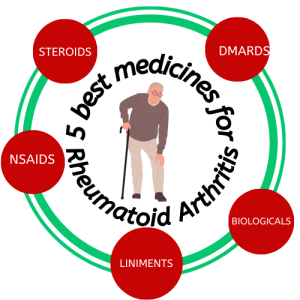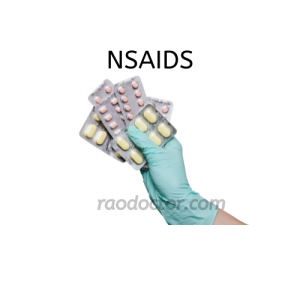
Table of Contents
The Best Drugs Used in the Treatment of Rheumatoid Arthritis: A Comprehensive Guide
Drugs or medicines are the mainstay of any treatment in Rheumatoid Arthritis. They help relieve pain, reduce joint stiffness and help a patient to get ample rest while they work on the affected joints.
By now you are very much aware that rheumatoid arthritis is a type of autoimmune disease where the body’s immune system attacks its own joints.
The patient develops inflammation and swelling in one or more joints, which leads to pain and other complications.
Rheumatoid arthritis can be managed by a combination of medication and lifestyle changes.
In my previous articles I discussed non-pharmalogical/alternative methods to reduce pain and discomfort of RA. They were-
Now, in this articles we will discuss the pharmacological line or medical line of treatment.
Disclaimer:-
The purpose of writing this article is to let the reader know actions, reactions and side effects of drugs used in treating RA. It is not a prescription for treatment- you should consult your treating physician for the same.
What are the different types of medicines/drugs available to treat RA?
There are 4 different types of drugs that can help reduce pain, swelling, and other symptoms of rheumatoid arthritis.
These include: –
- Nonsteroidal anti-inflammatory drugs (NSAIDS),
- Corticosteroids, and
- Disease-modifying antirheumatic drugs (DMARDs).
- Biologicals
A word of caution here….
All the medications used for the treatment of RA may have serious side effects or adverse reactions. They are prescription drugs. Therefore, it would be wise that you take these medicines only after consultation with a rheumatologist or your family physician.
The drugs used to manage rheumatoid arthritis may have side effects, but they also help control the disease when used as part of treatment regimen. Let’s take a closer look at some of the commonly used drugs in the management of rheumatoid arthritis: –
1. NSAIDS
Nonsteroidal anti-inflammatory drugs or NSAIDs are among the most commonly used drugs for managing rheumatoid arthritis. They are available as over-the-counter drugs in the form of tablets, capsules, and syrups. NSAIDs help relieve pain and reduce joint inflammation by blocking cyclooxygenase enzymes.
NSAIDs are especially helpful in the initial stages of rheumatoid arthritis, where they can help improve joint swelling and stiffness. Acetaminophen, tramadol, codeine, opiates, and various other analgesic medications can be used to reduce pain. These agents do not affect swelling or joint destruction
How do NSAIDS work?
NSAIDs interfere with prostaglandin synthesis-a chemical in the body that causes pain and swelling of joints– through inhibition of the enzyme cyclooxygenase (COX), thus reducing swelling and pain.
Source- Medscape.
Some commonly used NSAIDs
Commonly used NSAIDs by your doctor include
- ibuprofen e.g., Brufen, Advil, Motrin, Ibugesic
- naproxen e.g., Naprosyn, Aleve, Anaprox, Naprelan
- ketoprofen e.g. Ketoral
- piroxicam e.g. Ugesic, Pirox, Dolonex
- diclofenac, e.g., Voveran, Diclonal, Cambia.
- celecoxib- Celebrex
Side effects of NSAIDs
NSAIDs can have side effects like dizziness, nausea, vomiting, and abdominal pain. They can also cause significant gastrointestinal bleeding. Women who are pregnant or breastfeeding should not use NSAIDs or use it with caution.
People who are on blood thinner, have an allergy to aspirin, suffer from ulcers, or have kidney disease should also avoid NSAIDs.
Side effects of NSAIDs can be more severe in people with rheumatoid arthritis. They are also more likely to suffer from serious side effects when compared to people who have osteoarthritis.
Some of the most common side effects of NSAIDs are gastrointestinal problems, dizziness, headache, and an increase in blood pressure.
2. Corticosteroids in RA
Corticosteroids are powerful immune suppressants that can help control joint pain and inflammation. They are effective in the short-term treatment of rheumatoid arthritis.
Corticosteroids are prescribed as injections or taken orally in the form of tablets. Corticosteroids have numerous side effects and they should only be used as a short-term treatment.
They can cause weight gain, high blood pressure, an increased risk of infections, and may even cause osteoporosis. People with diabetes, kidney disease, hypertension, and glaucoma should not use corticosteroids.
Corticosteroids are potent anti-inflammatory drugs that are commonly used in patients with RA to bridge the time until treatment with DMARDs is effective.
These agents are effective adjuncts to DMARD or NSAID therapy.
Commonly used corticosteroids
- Prednisone [Omnacortil, Rayos, Intensol]is a commonly used drug in RA.
- Methylprednisone [ Depo-Medrol.Medrol,Solu-Medrol ]
Side effects of corticosteroids
Side effects of corticosteroids can be severe, especially when taken over a long period of time. Some of the most common side effects of corticosteroids are: –
- osteoporosis,
- muscle weakness,
- high blood pressure, and
- mood swings.
Immune system suppressants
Warning-
Before I begin discussing this group of drugs, a word of caution- these medicines are to be used strictly under the supervision of a Rheumatologist as they have serious side effects.
3. Disease-modifying antirheumatic drugs (DMARDs)
DMARDs are a combination of medines that are used to manage rheumatoid arthritis. The medications are usually prescribed when symptoms become severe, or the disease does not respond to treatment.
DMARDs can help reduce joint pain, swelling, and stiffness. These drugs are usually taken orally in the form of capsules or tablets.
How do they work?
These medicines effectively suppress the immune activity that is causing inflammation of the joints in various ways. A detailed study of these drugs/medicines is beyond the scope of this article. However, if anyone is interested, you can kindly look up this link-Medscape.
Side effects of DMARDS: –
DMARDs have numerous side effects. People who are prescribed DMARDs should be aware of the risks associated with these medications. Some of the most common side effects of DMARDs are –
- gastrointestinal issues,
- allergic reactions,
- and low blood counts like lowered hemoglobin levels.
4. Biologic DMARDs
Biologic DMARDs are a type of immuno-suppressive drugs used to manage rheumatoid arthritis. These drugs are expensive and do not come cheap.
Biologic DMARDs are not used as a first-line treatment for rheumatoid arthritis. These drugs are given to patients who have severe rheumatoid arthritis that does not respond to conventional treatment. Biologic DMARDs used for the treatment of rheumatoid arthritis are derived from antibodies.
How do they work?
They work by targeting and neutralizing the antibodies of the immune system responsible for causing rheumatoid arthritis.
Side effects of biological DMARDS
Biologic DMARDs have numerous side effects. They can cause serious infections, high blood pressure, and even death. People who are prescribed biologic DMARDs should be aware of the risks associated with these medications.
Conventional DMARDS
Conventional DMARDs are drugs used to treat rheumatoid arthritis. They are second-line treatment options for patients who have moderate to severe rheumatoid arthritis that does not respond to NSAIDs or corticosteroids. Conventional DMARDs can be taken as pills or injections.
Side effects of DMARDS
Conventional DMARDs have numerous side effects. They can cause low blood counts, gastrointestinal issues, and allergic reactions. People who are prescribed conventional DMARDs should be aware of the risks associated with these medications.
Side effects of DMARDS can be severe. Some of the most common side effects of DMARDS are low blood counts, gastrointestinal issues, and allergic reactions.
Commonly used DMARDs
The description of the DMARDS mentioned below are beyond the scope of this article as they are highly scheduled drugs. So, I will describe it in the shortest possible way-
Methotrexate –
This is the most commonly used medicine in RA. It is indicated for the management of severe, active rheumatoid arthritis (RA) in adults who have had a poor response or intolerance to an adequate trial of first-line therapy including full dose NSAIDs.
Other drugs in this group are-
Otrexup
Rasuvo or RediTrex
Folic acid tablets are used as an adjunct while treating RA with DMARDS to reduce the risk of adverse reactions to the above mentioned medicines.
5. Local Applications- Rubefacients and Liniments
Finally, the treatment of RA is never complete without some local application like rubefacient ointments/gels or liniments. They are not medicines per se, but along with medicines, they serve the purpose of relieving pain and increasing comfort of joints while resting. These can be purchased without a prescription at your local store or online.
Shown below are some of the commonly used local applications-


Note- You can get these products at highly discounted rates and with many other benefits if you have an Amazon Prime membership. Click the country wise links given below to get the Amazon Prime membership-
Alternately, you can go through this article that I have specifically written on these tools.
Disclosure–
The links for products shown above and links for respective countries are affiliate links, meaning that if you purchase any product using this link, the author gets a small commission without any extra cost to the purchaser [along with the displayed discount]. This helps me in maintaining this website and getting fresh content to you that comes absolutely free with it as and when it is published. Most of my pictures are designed on Canva Pro- click this link if you would like to get Canva Pro.
Conclusion
Well, as I conclude this article, let me remind you that rheumatoid arthritis is a debilitating condition that can be managed using a combination of drugs and lifestyle changes.
There are different types of drugs that can help reduce pain, swelling, and other symptoms of rheumatoid arthritis. These include nonsteroidal anti-inflammatory drugs (NSAIDS), corticosteroids, and disease-modifying antirheumatic drugs (DMARDs).
The drugs used to manage rheumatoid arthritis may have side effects, but they also help control the disease when used as part of treatment regimen.
Now as I have come to the end of my series of articles/blogs on rheumatoid arthritis. I hope I have been able to enlighten you on all that goes with the disease. If you have liked this article, do share it some people you know and those who can benefit from reading it.
One more thing before I say goodbye- Do give your suggestions in the comment box on what you would like to read next in my future articles.
Adios.


